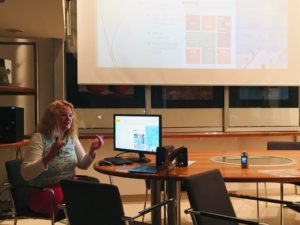Prof. Rachel Amir’s message to women, “Go with your dreams, with what you think is right and according to your inner desires. Do not give up. Tell yourself that you are capable, even when you are told you are not.”
Prof. Rachel Amir’s inspiring story combines spirit and science and proves, that with iron willpower and motivation, almost any dream can come true. Prof. Amir is head of the Plant Metabolism Research group at MIGAL-Galilee Research Institute, in Israel, head of the master’s program in biotechnology and responsible for advanced degrees in science at Tel Hai College. She was born on Kibbutz Yad Mordechai in the southern part of Israel and came to the Galilee in the north in her late teens.
Prof. Amir’s plan of study included more than just a bachelor’s degree; however, she felt a slight discomfort, when telling family and friends of her plan. In those days, it was not acceptable for woman members of the kibbutz to learn more than one degree. Prof. Amir, for who the bachelor’s degree was not enough, was not willing to surrender to the dictates of the kibbutz or to give up on her desires and dreams. She left the kibbutz, even before beginning with her studies. “I am proud that I funded all of my studies without asking for help”, she told. “I worked hard before starting to study, and, as was common among many that grew up on kibbutzim (plural of kibbutz) then, I did not even have a high school diploma”. She did her bachelor’s degree in Plant Protection Science at Tel Hai College in a combined track with the Robert H. Smith Faculty of Agriculture, Food and Environment of the Hebrew University. This was followed by a master’s degree in the Botanical Department in Tel Aviv University.
You can do it, even when they tell you “you can’t”.
When Prof. Amir says, “Don’t give in!” she knows very well what she is talking about. When she approached, Prof. Dan Levanon with the request to do a doctorate in MIGAL, he answered decisively, “It will not be!” In response, Prof. Amir said, “It will be, because I want it!” This argument was repeated a number of times, and in the end in 1988, Prof. Lebanon surrendered. From then until today, 42 years later, a special name is saved for Prof. Amir, as the first Ph.D. student in MIGAL-Galilee Research Institute. After her doctorate, Prof. Amir did her post-doctorate in Weizmann Institute in Israel. Her message to women: “Go with your dreams, with what you think is right and according to your inner desires. Do not give up. Tell yourself that you are capable, even when you are told you are not.”
Prof. Amir continues till this day to break conventions; she is often in a very male environment – in the Council for Higher Education, in an appointing committee at Tel Hai College, in MIGAL and in committees judging research proposals. “I have the energy to advance women in all these committees”, she explains.
A female mentor may have improved the balance between home and career.
Prof. Amir is married to Ofer, her partner since her last year in high school. The couple has three children, ages 28-35, and she admits that it was difficult to find the balance between work and home. “I spent more time working in MIGAL than at home.” In retrospect, if I had had a woman mentor, possibly the balance between home and career would have been different. Today, I am myself a mentor, and I recommend each female researcher to get advice from a female mentor that works in the field”.
Today, Prof. Amir is a leading world authority in the field of methionine, an essential building block of proteins, which animals and humans cannot produce in their bodies, and which has a low level in plants. When methionine is lacking in food, the motor and cognitive development of living creatures is arrested. Another research subject of hers is the regulation of active materials in pomegranates, which contain many constituents that slow down inflammation, atherosclerosis and signs of aging. A third project deals with the metabolic profile of parasitic plants (held by Prof. Amir in picture), which damage crops and cause a reduction in yield.
Don’t get upset from failures.
Yet, she does not get upset from failures, definitely not professional failures. “Failure is an inseparable part of success. I used to be sensitive to failures, but with time I understood that together with successes there are also failures, and today I know how to deal with them. In addition, I understand that I don’t understand, and in that manner, I reduce my level of frustration. Each time that I understand something, other unanswered questions arise. So, I feel comfortable in accepting this understanding, doing research and moving forward.” (Translated and partially summarized from an article in Hebrew, “Al Hazafon”, 16.6.2021.)















